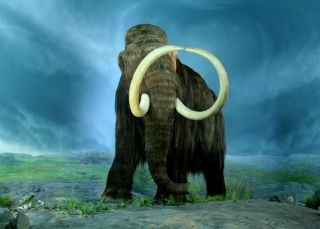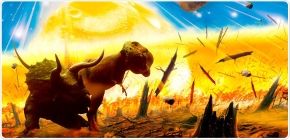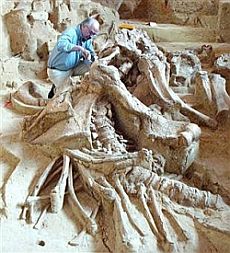
Publisher:
Bonnie King
CONTACT:
Newsroom@Salem-news.com
Advertising:
Adsales@Salem-news.com

~Truth~
~Justice~
~Peace~
TJP
Aug-23-2010 20:17

 TweetFollow @OregonNews
TweetFollow @OregonNews
Why Extinction May Soon be Extinct
Salem-News.comIn a relative handful of years extinct animals will be brought back. Science fiction? Not anymore.
 For close to a decade, research scientists in Japan have sent teams to the great northern tundras to harvest the genetic material of woolly mammoth carcasses. Recently, the Japanese researchers announced they have all the genetic material necessary to reconstruct the mammoth's DNA chain and implant an elephant. Courtesy: typeofdinosaurs.blogspot.com |
(CHICAGO) - A recent article in the UK's Daily Telegraph bemoaned the possible extinction of up to one-third of the lifeforms on Earth. (see: Third of plants and animals 'at risk of extinction' - telegraph.co.uk)
 Ahmed Djoghlaf, CBD Executive Secretary |
But articles like these overlook the emerging bio-technologies of the 21st Century. As Mankind's knowledge grows exponentially, so do the technological applications of that knowledge.
A case in point can be illustrated by the ongoing concerns over the extinction of species and endangered species.
Despite the fact that Moore's article in the Telegraph quotes short-sighted doomsayers like Ahmed Djoghlaf, who heads the Convention on Biological Diversity, their pronouncement echoes those of a predessor organization: The Club of Rome. That group proclaimed that the Earth could not sustain human population growth by the mid-1980s and predicted worldwide famine and the collapse of civilization.
Today, Djoghlaf states, “It’s a problem if we continue this unsustainable pattern of production and consumption. If the 9 billion people predicted to be with us by 2050 were to have the same lifestyle as Americans, we would need five planets.”
He then makes the argument that a large extinction of species will occur. Of course he doesn't mention that mass extinctions are normal in the history of the Earth and during the last one about 99% of all species became extinct.
In case anyone thinks that mass extinction was because of human interference, that extinction happened many millions of years before homo sapiens appeared on the planet.
Organizations like the Convention on Biological Diversity and individuals like Djoghlaf are at best guilty of a failure of vision. To date, humans are nature's highest achievement and people are endowed with cognitive skills enabling them to think through problems, create solutions or work-arounds, and continue forging ahead. Truly humans are the most adaptable creatures on Earth.
The emerging science of resurrection
In a relative handful of years extinct animals will be brought back. Science fiction? Not anymore. The science of species resurrection has reached our doorstep. As our knowledge inches inexorably closer to achieving resurrection of that which was once extinct big business is preparing to get involved.
For close to a decade, research scientists in Japan have sent teams to the great northern tundras to harvest the genetic material of woolly mammoth carcasses. Recently, the Japanese researchers announced they have all the genetic material necessary to reconstruct the mammoth's DNA chain and implant an elephant.
One day in the not too distant future an elephant will give birth to the first woolly mammoth in 10,000 years . The first mammoth brought back from extinction will be an overnight sensation.
Already some of the world's top zoos are expressing an interest in obtaining living woolly mammoths.
According to another article that appeared in the U.K. Telegraph, 'The genomes of several extinct species besides the mammoth are already being sequenced.' Animals such as the saber-toothed tiger and dodo bird are being discussed as candidates for resurrection.
Is extinction about to become...extinct?
Courtesy: Adam Savage's dodo bird skeleton & the Smithsonian Institute |
When we bring back saber-toothed tigers or dodo birds are any species really in danger of permanent extinction? No. Once we can reconstitute the DNA chain we can bring any species back.
The resurrection 'movement' has reached a breakneck pace. Scientists recently announced another successful first: the 'resurrection' of a gene from the Tasmanian tiger by implanting the gene in a laboratory mouse.
Scientists are already cataloging thousands of such animals. Incredible as it may seem, chickens could carry Tyrannosaurus Rex embryos and lay a T-Rex egg, while Komodo dragons have been given the nod to carry genetically resuscitated 'Sarcosuchus imperators' (flesh crocodile emperors). Those monsters grew to a length approaching 40 feet and are estimated to have weighed more than eight tons. (By comparison, modern crocodiles rarely grow longer than 14 feet and weigh in at less than 1,000 pounds.)
While there may not be much chance of bringing back dinosaurs with today's biotechnology, we are on the threshold of resurrecting much more modern creatures. Most genetic scientists agree that once one animal is resurrected many more will be slated to be brought back. Thousands of species can—and will—be plucked from oblivion.
Eventually, endangered species organizations will themselves be extinct.
For more on how extinction could become extinct and interesting links on resurrecting animals go here.
 Terrence Aym is a Salem-News.com Contributor based in Chicago, who is well known nationally for his stirring reports on the top ranked site, helium.com. Born in Minnesota, Terrence Aym grew up in the Chicagoland suburbs. Having traveled to 40 of the 50 states and lived in 7 of them, Aym is no stranger to travel. He's also spent time in Canada, Mexico, the Caribbean, Europe, Asia and Western Africa. An executive for many years with Wall Street broker-dealer firms, Aym has also had a life-long interest in science, technology, the arts, philosophy and history. If it's still possible to be a 'Renaissance man' in the 21st Century, Aym is working hard to be one.
Terrence Aym is a Salem-News.com Contributor based in Chicago, who is well known nationally for his stirring reports on the top ranked site, helium.com. Born in Minnesota, Terrence Aym grew up in the Chicagoland suburbs. Having traveled to 40 of the 50 states and lived in 7 of them, Aym is no stranger to travel. He's also spent time in Canada, Mexico, the Caribbean, Europe, Asia and Western Africa. An executive for many years with Wall Street broker-dealer firms, Aym has also had a life-long interest in science, technology, the arts, philosophy and history. If it's still possible to be a 'Renaissance man' in the 21st Century, Aym is working hard to be one.
Aym has several book projects in the works. Media sites that have recently featured Aym, and/or discussed his articles, include ABC News, TIME Magazine, Business Insider, Crunchgear.com, Discover, Dvice, Benzinga and more recently, his work has been showing up in South Africa and Russia.
Articles for August 22, 2010 | Articles for August 23, 2010 | Articles for August 24, 2010





Quick Links
DINING
Willamette UniversityGoudy Commons Cafe
Dine on the Queen
Willamette Queen Sternwheeler
MUST SEE SALEM
Oregon Capitol ToursCapitol History Gateway
Willamette River Ride
Willamette Queen Sternwheeler
Historic Home Tours:
Deepwood Museum
The Bush House
Gaiety Hollow Garden
AUCTIONS - APPRAISALS
Auction Masters & AppraisalsCONSTRUCTION SERVICES
Roofing and ContractingSheridan, Ore.
ONLINE SHOPPING
Special Occasion DressesAdvertise with Salem-News
Contact:AdSales@Salem-News.com
Terms of Service | Privacy Policy


All comments and messages are approved by people and self promotional links or unacceptable comments are denied.
[Return to Top]
©2025 Salem-News.com. All opinions expressed in this article are those of the author and do not necessarily reflect those of Salem-News.com.